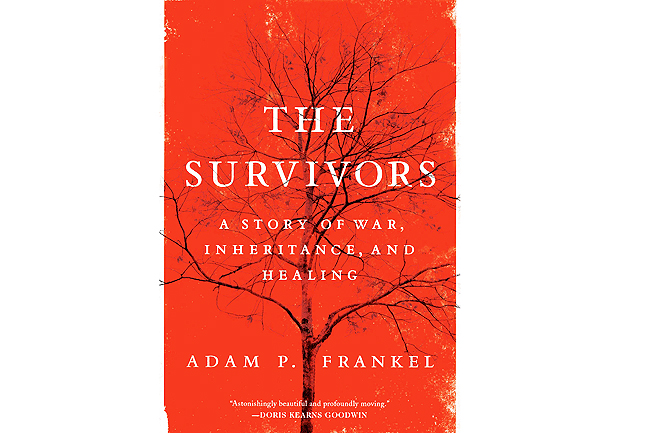BOOK REVIEW: THE WASHINGTON POST- The Holocaust, mental illness and a family’s secrets
BOOK: Adam Frankel’s The Survivors: A Story of War, Inheritance, and Healing
.
.

THE WASHINGTON POST – The subtitle of Adam Frankel’s The Survivors: A Story of War, Inheritance, and Healing suggests that the author is preoccupied with his family and its trauma. The dominating figure in his tale is his troubled mother, the daughter of Holocaust survivors whose presence in her son’s otherwise privileged life has been the defining torment for him.
But Frankel has other legacies as well, both positive and negative: a family tradition of secrets and lies; the steady presence of his father, with whom he shared a deep bond; passionate engagement from both sets of grandparents; the benefits of an extremely well-connected, upper-middle-class family; and the pleasure of being beloved by his mother’s family, with its extraordinary stories of suffering and survival.
.
ADS by Cloud 9:
– SPACE RESERVE FOR YOUR ADVERTISEMENT –

–
Frankel, an Obama speechwriter during his initial campaign and first term in office, enjoyed what was, in many ways, a charmed life. Though his parents divorced when he was four, they shared custody, a win, his father thought, “at a time when mothers were typically awarded sole custody.” His mother was troubled – mentally ill and occasionally suicidal – but highly functional.
So Frankel was protected, in many ways, thanks to some strong countervailing forces from both his father, Stephen, and the extended family. But then, in his early 20s, after years of taking care of his mother as she struggled with depression and frightening volatility, he put some pieces of his personal puzzle together and asked if the man he believed to be his father in fact was his father.
Frankel could have written several books from all this rich material. There’s the harrowing yet redemptive Holocaust story of his maternal grandparents – his grandfather who survived and saved his own father by becoming a watchmaker in a Dachau subcamp, his grandmother who hid for two years in a forest.
.
ADS by Cloud 9:
– SPACE RESERVE FOR YOUR ADVERTISEMENT –

–

And there’s the story of Frankel being the only child of a mentally ill mother. Her dependence on him, coupled with the constant threat of another suicide attempt and her seemingly bottomless capacity for injury and attention-seeking, became one of the organising principles of his life.
His father’s family also offers rich material. Grandma and Pa were the stable, loving, undramatic and solid figures in Frankel’s life.
.
ADS by Cloud 9:
– SPACE RESERVE FOR YOUR ADVERTISEMENT –

–
Theirs is a massive family tree extending from a 16th-Century rabbi from Padua to Frankel’s father, with branches including Karl Marx, philosopher Martin Buber, composer Felix Mendelssohn and journalist David Halberstam.
This is interesting not just because of the reassuring collection of high-achieving boldfaced names – who wouldn’t want that DNA? – but also because this genealogy bespeaks a family of remarkable continuity and prosperity, despite the long history of catastrophes of Jewish life.
Another book that might have emerged from this one could have focussed on the many experts Frankel interviewed to examine epigenetics and the reverberations of trauma through generations.
Or maybe, Frankel could have left that all behind and instead written about the special demands of being a speechwriter for a president as preternaturally eloquent as Obama.
Newton Minow, now 93, is the author’s Grandma’s brother-in law.
As chairman of President John Kennedy’s Federal Communications Commission, Minow gave a speech in 1961 describing television as “a vast wasteland,” indelibly characterising the medium for decades.
.
ADS by Cloud 9:
– SPACE RESERVE FOR YOUR ADVERTISEMENT –

–
Frankel’s connection to Minow led to his introduction to Kennedy’s speechwriter Ted Sorensen, which led to a gig assisting Sorensen with his memoir when Frankel was an undergrad at Princeton, and then another introduction to, and eventual employment with, a young African American senator from Illinois who had the audacity to think he could run for president. Which is to say that as talented as Frankel clearly is, family connections have helped to shape his life’s trajectory.
Frankel has brought all of these many strands into his narrative. And for this reader, even though the story contains layers of drama, it somehow feels hollow at its core. Frankel’s detailed probing of his own depth of emotion, his truly monumental suffering, gives the memoir the feel of a therapy session.
The existential themes of identity, loyalty, mental illness, the Holocaust, family secrets, the search for meaning, love and marriage sometimes prompt repetitive ruminations and a torrent of questioning. In two short paragraphs on a single page: “Had I made some terrible mistake? … Would I have been better off if I’d never started asking questions in the first place? … Was it my fault, in a way? Had I brought all of this on myself?”
When Frankel offers a psychological insight, he seems to accept it only if an expert weighs in. After quoting part of a “thousand-word email” he wrote to his mother’s judgmental siblings to explain his side of their estrangement, he turns to Susan Brison, a Dartmouth philosopher and rape survivor, who said one condition of healing for trauma survivors was “telling their stories to understanding listeners.”
.
ADS by Cloud 9:
– SPACE RESERVE FOR YOUR ADVERTISEMENT –

–
Frankel asks: “Was that why I craved my family’s understanding so badly? Because I sensed I needed it for my own healing?” This type of insertion becomes a kind of nervous tic, as if the significance of his personal insights cannot come merely from felt experience but must be legitimized by an expert he calls, or a peer-reviewed secondary source he discovers, or an understanding rabbi he consults. Nor is there any apparent capacity for leavening his suffering with some humor or self-irony. When he was a young speechwriter, he shared an office with another speechwriter, Jon Lovett. “‘Jesus Christ,’ he would occasionally yell. ‘Would you stop sighing?’” I smiled, but Frankel couldn’t. “Now, I wonder if my sighing was a release of the heaviness I was carrying around,” he writes.
In the end, Frankel seeks to unify his narrative by tying his mother’s mental illness, which he diagnoses as borderline personality disorder, and his own suffering to the most monumental suffering of all: her parents’ Holocaust trauma. Clearly, trauma reverberates through generations. Still, I just couldn’t shake the sense that for Frankel, what his grandparents endured and survived is deployed as yet another piece of evidence to amplify and justify the magnitude of his own pain.
By Marianne Szegedy-Maszak
.
.
ADS by Cloud 9:
– SPACE RESERVE FOR YOUR ADVERTISEMENT –

–
All photographs, news, editorials, opinions, information, data, others have been taken from the Internet ..aseanews.net | [email protected] | For comments, Email to : BOOKRICH @ yahoo.com / Contributor









